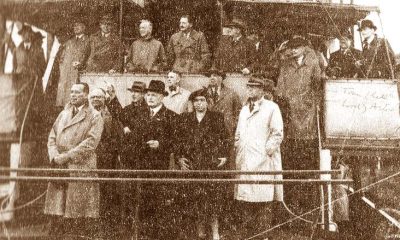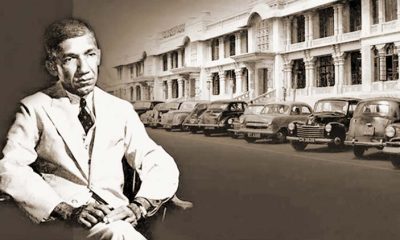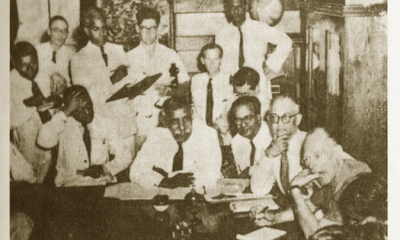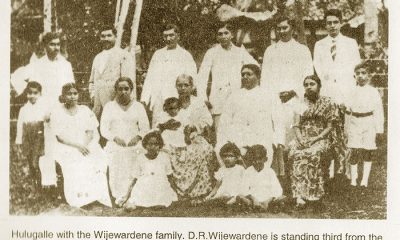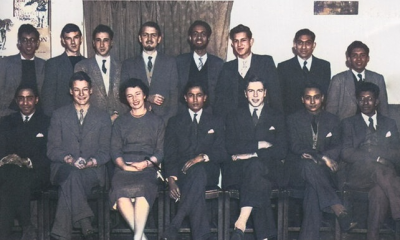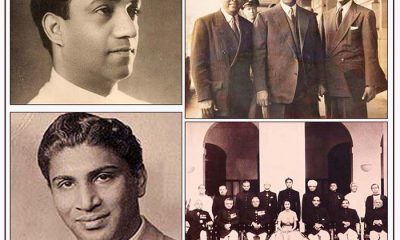Features
Sir John Kotelawala (1897- 1980): How he grew in DS’s shadow and became an effective leader
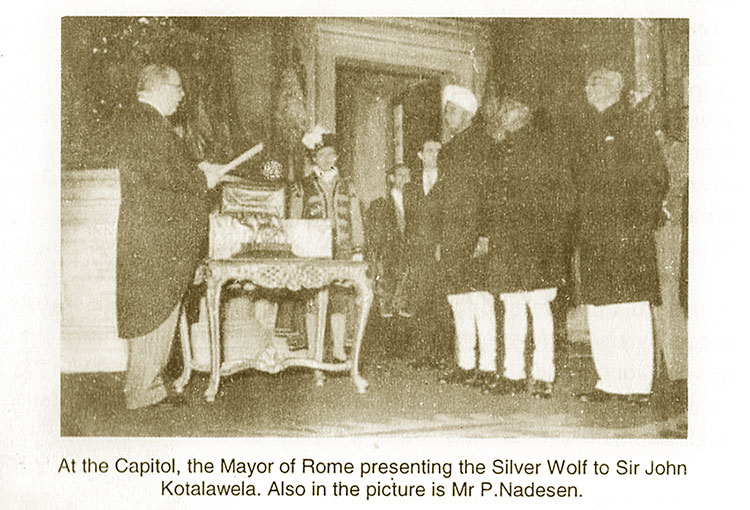
(Excerpted from Selected Journalism by HAJ Hulugalle)
Twenty-five years ago, I was unexpectedly called to the editorial chair of the “Ceylon Daily News”, to succeed a brilliant journalist whose pen today is as lively an instrument as ever. From that position of advantage I was able, for nearly 18 years, to watch the evolution of what was at first a Crown Colony into an independent nation.
And now, from this ancient city of Rome, which has given to the world a noble heritage of spirit and mind, I can look back over a quarter of a century of immeasurable change in Ceylon and think of the many remarkable men who achieved her freedom. It was in those same years that a dashing, care-free and athletic cadet of the landed gentry grew in political stature to become the resolute statesman, known and respected throughout the world. His fame was not attained by sudden flight and few of his early boon companions, their “hours filled with riots, banquets, sports”, would have prophesied the flowering of a career which by any standards must be deemed exceptional. And yet, history records such transformations. Shakespeare said of Henry V:
“The strawberry grows underneath the nettle,
And wholesome berries thrive and ripen best, Neighbour’d by fruit of baser quality.
And so the Prince obscured his contemplation, Under the veil of wildness; which, no doubt,
Grew like the summer grass, fastest by night, Unseen, yet crescive in his faculty.”
As a youthful journalist I trailed Mr. D. R. Wijewardene, as great a patriot as he was a publicist, into the inner councils of the pioneers of the reform movement where it was an unforgettable experience to observe the methods and manners of men like Ponnambalam Arunachalam, James Pieris, E. J. Samerawickreme, D. B. Jayatilaka, H. J. C. Pereira, F. R. Senanayake, W. A. de Silva, E. W. Perera and others of the same vintage.
Stephen Senanayake was among them, but somewhat overawed by that galaxy of legal talent. His day came later and he was indeed the boldest and doughtiest warrior of them all. Even before Ceylon obtained partial self-government under the Donoughmore Constitution, “D.S.” was the driving force in the Legislative Council which was then led by the gentle and amiable Sir Arthur Fletcher. By a combination of shrewdness in the Finance Committee, which sat in secret, and buccaneering conduct in the Council itself, he dominated the scene though he held no office and was only Member for Negombo.
And in those years young John Lionel Kotelawala was his protege and became increasingly his handyman. He possessed in abundance some of the qualities which the older man lacked. He had sophistication. He had been to Cambridge, he had danced and dined at the best clubs, he spoke French fluently, his character was moulded in the hard school of adversity and, above all he had youthful zest and, what is now called, brashness. What is not less important perhaps is that the younger man had an unsuspected capacity for taking thought of the mundane things so necessary for success, such as physical fitness and financial stability.
When that great lawyer, Sir John Simon, was once asked what were the ingredients of success in his profession, he replied readily that they were, firstly, a sound digestion and, secondly, a good clerk. There is no doubt that a double dose of energy, usually the result of a good digestion, is necessary in any outstanding leader, though of course it is not the only requisite.
From the time “J.L.K.” entered the State Council he wielded an increasing influence on the life and work of Mr. D.S. Senanayake. When “D.S.” left for England he arranged for Lionel to be in charge of his portfolio as Minister of Agriculture. He could not trust anyone else with the blue-prints of his great colonisation schemes and it fell to the acting Minister to cut the first sod in the new colony. The partnership continued until the death of the Father of the Nation.
“D.S.” was a great originator but scarcely a great organizer. He knew next to nothing of the logistics of a political campaign. He organized an election as the old kings organized the building of a tank or the dedication of a shrine. He was sustained, and sometimes compromised, by his local chiefs and retainers. Lionel Kotelawala had the good sense to become a soldier as a young man.
In the mess room he cultivated good human relations, in the barrack square he learned the value of precision and, on manoeuvres, he studied the strategy and tactics of a campaign. These assets he carried into politics and he became the invaluable and indispensable chief of staff.
My first official contact with the Prime Minister was when, as the new Government Information Officer, I was invited to attend a Press Conference in his office in the Public Works Department building. When I arrived I found that business had started some considerable time before, and I felt like the man in a Bateman cartoon who came to dinner wearing brown boots with his dress clothes.
Everyone in the room stared at me with looks of disapproval. They seemed to say that the “Boss” did not like unpunctuality and it was not good form to come late to his Press Conferences. I was let down by my watch or by a bad memory – I do not remember which – and I had even thought I would be too early for the appointment. But of course excuses were useless; one was in time or one was not; and it was not only bad manners but inefficiency to keep waiting a man who values his time. That was how I felt about it.
This love of discipline and order is surely of inestimable value in guiding the affairs of a people who are by nature easy-going and lackadaisical. But it is not a discipline untempered with human feeling. A mother’s tenderness must always leave its mark. The “P.M.” can judge himself as rigorously as he would others. He will say blunt and even embarrassing things but never from a sense of superiority or with the intention to wound. And one of his charming qualities is that of turning a joke against himself.
It is seldom that a strong trunk grows under a giant oak and it speaks much for the sturdy personality of John Lionel Kotelawala that he rose to his full stature under the shadow of so great a man as our first Prime Minister. The secret lies perhaps in the fact that in their characters there were as many points of difference as there were of similarity. In courage, energy, geniality, knowledge of men and love of country, they were alike. But the resilience which comes of a boyish spirit and the zest for enjoying life, “D.S.” lacked.
He could not easily throw off the cares of office and give himself to the needs of the moment. The late Mr. David Lloyd George once said that his buoyancy was due to the fact that he had the knack of concentrating on one thing at a time. When he brushed his hair, he only thought of his hair and not of the Cabinet meeting he was due to attend a few minutes later. He could fall asleep whenever he felt the need for it.
“D.S” was a wise man but not a witty one. He could rarely make an interesting speech and had no feeling for a good phrase. He could not, for instance, say, as Sir John did when he raised his glass at the banquet given in his honour in the great Medici Palace, Villa Madama, in Rome: “On behalf of Ceylon, I salute Italy, the Light of Europe” a sentiment which brought a glow to the faces of the select company which graced that noble room and which seemed to elicit an approving nod from the Medici princes whose portraits hung on the walls, As a raconteur Sir John has few equals, even among the Prime Ministers of the world. Ask him to tell the story of how “D.S.” was mistaken for a lawyer and argued and won a case.
I have just returned from West Africa where I met statesmen who had seen Sir John in various parts of the world, in Bandung, Washington, Bonn and elsewhere. The impact of his personality seems to have made a lasting impression on these men.
It is not necessary to be in agreement with his politics to recognize qualities of leadership. One sees in Europe and, indeed, everywhere in the world, that peace and good government are the products of resolute leadership. Democracy means nothing if it does not bring to the surface men who are unafraid of difficulties and who grow in stature and humanity in proportion to the responsibilities placed on them. The power to inspire as well as give loyalty, the capacity to command as well as accept the will of the people, the gift of judging men as well as the significance of events, these are qualities which make a good executive. And what is a Prime Minister but the chief executive of the nation?
As an executive, the Prime Minister ranks high, a fact which comes to mind forcibly when one watches the desperate efforts made by under-developed countries to cut through red tape and get the jobs done. Countries which have enjoyed independence for over a hundred years would be glad to have the schools, highways, hospitals, townships, water schemes and harbour and telecommunication facilities which Ceylon has acquired during his tenure of office as Minister.
In my journalistic career, one of the things which gave me the greatest satisfaction was the successful issue of the campaign which the “Daily News” carried on for a residential University. We fought against the most formidable odds. It was often a desperate struggle with the result quivering in the balance. When the legislative hurdles were surmounted, the War came and lack of enthusiasm on the part of the authorities concerned bogged down the whole scheme.
Then it was that Mr. D.R. Wijewardene discovered the true calibre of the then Minister of Works. He went to him and inspired him to action. Today we have what, in the opinion of those best qualified to judge, is the most beautiful University in the world. It is true that beauty alone does not make a University great. We cannot judge, but it is there. It is there for present and future generations to make it what it should be. The time factor is inexorable. The lawns of Oxford are so smooth because they have been watered and mown for many centuries. Future generations will, nevertheless, bless the man who had the vision and wisdom to be guided aright to build for generations to come and not for the next 10 or 20 years only.
Features
The heart-friendly health minister

by Dr Gotabhya Ranasinghe
Senior Consultant Cardiologist
National Hospital Sri Lanka
When we sought a meeting with Hon Dr. Ramesh Pathirana, Minister of Health, he graciously cleared his busy schedule to accommodate us. Renowned for his attentive listening and deep understanding, Minister Pathirana is dedicated to advancing the health sector. His openness and transparency exemplify the qualities of an exemplary politician and minister.
Dr. Palitha Mahipala, the current Health Secretary, demonstrates both commendable enthusiasm and unwavering support. This combination of attributes makes him a highly compatible colleague for the esteemed Minister of Health.
Our discussion centered on a project that has been in the works for the past 30 years, one that no other minister had managed to advance.
Minister Pathirana, however, recognized the project’s significance and its potential to revolutionize care for heart patients.
The project involves the construction of a state-of-the-art facility at the premises of the National Hospital Colombo. The project’s location within the premises of the National Hospital underscores its importance and relevance to the healthcare infrastructure of the nation.
This facility will include a cardiology building and a tertiary care center, equipped with the latest technology to handle and treat all types of heart-related conditions and surgeries.
Securing funding was a major milestone for this initiative. Minister Pathirana successfully obtained approval for a $40 billion loan from the Asian Development Bank. With the funding in place, the foundation stone is scheduled to be laid in September this year, and construction will begin in January 2025.
This project guarantees a consistent and uninterrupted supply of stents and related medications for heart patients. As a result, patients will have timely access to essential medical supplies during their treatment and recovery. By securing these critical resources, the project aims to enhance patient outcomes, minimize treatment delays, and maintain the highest standards of cardiac care.
Upon its fruition, this monumental building will serve as a beacon of hope and healing, symbolizing the unwavering dedication to improving patient outcomes and fostering a healthier society.We anticipate a future marked by significant progress and positive outcomes in Sri Lanka’s cardiovascular treatment landscape within the foreseeable timeframe.
Features
A LOVING TRIBUTE TO JESUIT FR. ALOYSIUS PIERIS ON HIS 90th BIRTHDAY

by Fr. Emmanuel Fernando, OMI
Jesuit Fr. Aloysius Pieris (affectionately called Fr. Aloy) celebrated his 90th birthday on April 9, 2024 and I, as the editor of our Oblate Journal, THE MISSIONARY OBLATE had gone to press by that time. Immediately I decided to publish an article, appreciating the untiring selfless services he continues to offer for inter-Faith dialogue, the renewal of the Catholic Church, his concern for the poor and the suffering Sri Lankan masses and to me, the present writer.
It was in 1988, when I was appointed Director of the Oblate Scholastics at Ampitiya by the then Oblate Provincial Fr. Anselm Silva, that I came to know Fr. Aloy more closely. Knowing well his expertise in matters spiritual, theological, Indological and pastoral, and with the collaborative spirit of my companion-formators, our Oblate Scholastics were sent to Tulana, the Research and Encounter Centre, Kelaniya, of which he is the Founder-Director, for ‘exposure-programmes’ on matters spiritual, biblical, theological and pastoral. Some of these dimensions according to my view and that of my companion-formators, were not available at the National Seminary, Ampitiya.
Ever since that time, our Oblate formators/ accompaniers at the Oblate Scholasticate, Ampitiya , have continued to send our Oblate Scholastics to Tulana Centre for deepening their insights and convictions regarding matters needed to serve the people in today’s context. Fr. Aloy also had tried very enthusiastically with the Oblate team headed by Frs. Oswald Firth and Clement Waidyasekara to begin a Theologate, directed by the Religious Congregations in Sri Lanka, for the contextual formation/ accompaniment of their members. It should very well be a desired goal of the Leaders / Provincials of the Religious Congregations.
Besides being a formator/accompanier at the Oblate Scholasticate, I was entrusted also with the task of editing and publishing our Oblate journal, ‘The Missionary Oblate’. To maintain the quality of the journal I continue to depend on Fr. Aloy for his thought-provoking and stimulating articles on Biblical Spirituality, Biblical Theology and Ecclesiology. I am very grateful to him for his generous assistance. Of late, his writings on renewal of the Church, initiated by Pope St. John XX111 and continued by Pope Francis through the Synodal path, published in our Oblate journal, enable our readers to focus their attention also on the needed renewal in the Catholic Church in Sri Lanka. Fr. Aloy appreciated very much the Synodal path adopted by the Jesuit Pope Francis for the renewal of the Church, rooted very much on prayerful discernment. In my Religious and presbyteral life, Fr.Aloy continues to be my spiritual animator / guide and ongoing formator / acccompanier.
Fr. Aloysius Pieris, BA Hons (Lond), LPh (SHC, India), STL (PFT, Naples), PhD (SLU/VC), ThD (Tilburg), D.Ltt (KU), has been one of the eminent Asian theologians well recognized internationally and one who has lectured and held visiting chairs in many universities both in the West and in the East. Many members of Religious Congregations from Asian countries have benefited from his lectures and guidance in the East Asian Pastoral Institute (EAPI) in Manila, Philippines. He had been a Theologian consulted by the Federation of Asian Bishops’ Conferences for many years. During his professorship at the Gregorian University in Rome, he was called to be a member of a special group of advisers on other religions consulted by Pope Paul VI.
Fr. Aloy is the author of more than 30 books and well over 500 Research Papers. Some of his books and articles have been translated and published in several countries. Among those books, one can find the following: 1) The Genesis of an Asian Theology of Liberation (An Autobiographical Excursus on the Art of Theologising in Asia, 2) An Asian Theology of Liberation, 3) Providential Timeliness of Vatican 11 (a long-overdue halt to a scandalous millennium, 4) Give Vatican 11 a chance, 5) Leadership in the Church, 6) Relishing our faith in working for justice (Themes for study and discussion), 7) A Message meant mainly, not exclusively for Jesuits (Background information necessary for helping Francis renew the Church), 8) Lent in Lanka (Reflections and Resolutions, 9) Love meets wisdom (A Christian Experience of Buddhism, 10) Fire and Water 11) God’s Reign for God’s poor, 12) Our Unhiddden Agenda (How we Jesuits work, pray and form our men). He is also the Editor of two journals, Vagdevi, Journal of Religious Reflection and Dialogue, New Series.
Fr. Aloy has a BA in Pali and Sanskrit from the University of London and a Ph.D in Buddhist Philosophy from the University of Sri Lankan, Vidyodaya Campus. On Nov. 23, 2019, he was awarded the prestigious honorary Doctorate of Literature (D.Litt) by the Chancellor of the University of Kelaniya, the Most Venerable Welamitiyawe Dharmakirthi Sri Kusala Dhamma Thera.
Fr. Aloy continues to be a promoter of Gospel values and virtues. Justice as a constitutive dimension of love and social concern for the downtrodden masses are very much noted in his life and work. He had very much appreciated the commitment of the late Fr. Joseph (Joe) Fernando, the National Director of the Social and Economic Centre (SEDEC) for the poor.
In Sri Lanka, a few religious Congregations – the Good Shepherd Sisters, the Christian Brothers, the Marist Brothers and the Oblates – have invited him to animate their members especially during their Provincial Congresses, Chapters and International Conferences. The mainline Christian Churches also have sought his advice and followed his seminars. I, for one, regret very much, that the Sri Lankan authorities of the Catholic Church –today’s Hierarchy—- have not sought Fr.
Aloy’s expertise for the renewal of the Catholic Church in Sri Lanka and thus have not benefited from the immense store of wisdom and insight that he can offer to our local Church while the Sri Lankan bishops who governed the Catholic church in the immediate aftermath of the Second Vatican Council (Edmund Fernando OMI, Anthony de Saram, Leo Nanayakkara OSB, Frank Marcus Fernando, Paul Perera,) visited him and consulted him on many matters. Among the Tamil Bishops, Bishop Rayappu Joseph was keeping close contact with him and Bishop J. Deogupillai hosted him and his team visiting him after the horrible Black July massacre of Tamils.
Features
A fairy tale, success or debacle

Sri Lanka-Singapore Free Trade Agreement
By Gomi Senadhira
senadhiragomi@gmail.com
“You might tell fairy tales, but the progress of a country cannot be achieved through such narratives. A country cannot be developed by making false promises. The country moved backward because of the electoral promises made by political parties throughout time. We have witnessed that the ultimate result of this is the country becoming bankrupt. Unfortunately, many segments of the population have not come to realize this yet.” – President Ranil Wickremesinghe, 2024 Budget speech
Any Sri Lankan would agree with the above words of President Wickremesinghe on the false promises our politicians and officials make and the fairy tales they narrate which bankrupted this country. So, to understand this, let’s look at one such fairy tale with lots of false promises; Ranil Wickremesinghe’s greatest achievement in the area of international trade and investment promotion during the Yahapalana period, Sri Lanka-Singapore Free Trade Agreement (SLSFTA).
It is appropriate and timely to do it now as Finance Minister Wickremesinghe has just presented to parliament a bill on the National Policy on Economic Transformation which includes the establishment of an Office for International Trade and the Sri Lanka Institute of Economics and International Trade.
Was SLSFTA a “Cleverly negotiated Free Trade Agreement” as stated by the (former) Minister of Development Strategies and International Trade Malik Samarawickrama during the Parliamentary Debate on the SLSFTA in July 2018, or a colossal blunder covered up with lies, false promises, and fairy tales? After SLSFTA was signed there were a number of fairy tales published on this agreement by the Ministry of Development Strategies and International, Institute of Policy Studies, and others.
However, for this article, I would like to limit my comments to the speech by Minister Samarawickrama during the Parliamentary Debate, and the two most important areas in the agreement which were covered up with lies, fairy tales, and false promises, namely: revenue loss for Sri Lanka and Investment from Singapore. On the other important area, “Waste products dumping” I do not want to comment here as I have written extensively on the issue.
1. The revenue loss
During the Parliamentary Debate in July 2018, Minister Samarawickrama stated “…. let me reiterate that this FTA with Singapore has been very cleverly negotiated by us…. The liberalisation programme under this FTA has been carefully designed to have the least impact on domestic industry and revenue collection. We have included all revenue sensitive items in the negative list of items which will not be subject to removal of tariff. Therefore, 97.8% revenue from Customs duty is protected. Our tariff liberalisation will take place over a period of 12-15 years! In fact, the revenue earned through tariffs on goods imported from Singapore last year was Rs. 35 billion.
The revenue loss for over the next 15 years due to the FTA is only Rs. 733 million– which when annualised, on average, is just Rs. 51 million. That is just 0.14% per year! So anyone who claims the Singapore FTA causes revenue loss to the Government cannot do basic arithmetic! Mr. Speaker, in conclusion, I call on my fellow members of this House – don’t mislead the public with baseless criticism that is not grounded in facts. Don’t look at petty politics and use these issues for your own political survival.”
I was surprised to read the minister’s speech because an article published in January 2018 in “The Straits Times“, based on information released by the Singaporean Negotiators stated, “…. With the FTA, tariff savings for Singapore exports are estimated to hit $10 million annually“.
As the annual tariff savings (that is the revenue loss for Sri Lanka) calculated by the Singaporean Negotiators, Singaporean $ 10 million (Sri Lankan rupees 1,200 million in 2018) was way above the rupees’ 733 million revenue loss for 15 years estimated by the Sri Lankan negotiators, it was clear to any observer that one of the parties to the agreement had not done the basic arithmetic!
Six years later, according to a report published by “The Morning” newspaper, speaking at the Committee on Public Finance (COPF) on 7th May 2024, Mr Samarawickrama’s chief trade negotiator K.J. Weerasinghehad had admitted “…. that forecasted revenue loss for the Government of Sri Lanka through the Singapore FTA is Rs. 450 million in 2023 and Rs. 1.3 billion in 2024.”
If these numbers are correct, as tariff liberalisation under the SLSFTA has just started, we will pass Rs 2 billion very soon. Then, the question is how Sri Lanka’s trade negotiators made such a colossal blunder. Didn’t they do their basic arithmetic? If they didn’t know how to do basic arithmetic they should have at least done their basic readings. For example, the headline of the article published in The Straits Times in January 2018 was “Singapore, Sri Lanka sign FTA, annual savings of $10m expected”.
Anyway, as Sri Lanka’s chief negotiator reiterated at the COPF meeting that “…. since 99% of the tariffs in Singapore have zero rates of duty, Sri Lanka has agreed on 80% tariff liberalisation over a period of 15 years while expecting Singapore investments to address the imbalance in trade,” let’s turn towards investment.
Investment from Singapore
In July 2018, speaking during the Parliamentary Debate on the FTA this is what Minister Malik Samarawickrama stated on investment from Singapore, “Already, thanks to this FTA, in just the past two-and-a-half months since the agreement came into effect we have received a proposal from Singapore for investment amounting to $ 14.8 billion in an oil refinery for export of petroleum products. In addition, we have proposals for a steel manufacturing plant for exports ($ 1 billion investment), flour milling plant ($ 50 million), sugar refinery ($ 200 million). This adds up to more than $ 16.05 billion in the pipeline on these projects alone.
And all of these projects will create thousands of more jobs for our people. In principle approval has already been granted by the BOI and the investors are awaiting the release of land the environmental approvals to commence the project.
I request the Opposition and those with vested interests to change their narrow-minded thinking and join us to develop our country. We must always look at what is best for the whole community, not just the few who may oppose. We owe it to our people to courageously take decisions that will change their lives for the better.”
According to the media report I quoted earlier, speaking at the Committee on Public Finance (COPF) Chief Negotiator Weerasinghe has admitted that Sri Lanka was not happy with overall Singapore investments that have come in the past few years in return for the trade liberalisation under the Singapore-Sri Lanka Free Trade Agreement. He has added that between 2021 and 2023 the total investment from Singapore had been around $162 million!
What happened to those projects worth $16 billion negotiated, thanks to the SLSFTA, in just the two-and-a-half months after the agreement came into effect and approved by the BOI? I do not know about the steel manufacturing plant for exports ($ 1 billion investment), flour milling plant ($ 50 million) and sugar refinery ($ 200 million).
However, story of the multibillion-dollar investment in the Petroleum Refinery unfolded in a manner that would qualify it as the best fairy tale with false promises presented by our politicians and the officials, prior to 2019 elections.
Though many Sri Lankans got to know, through the media which repeatedly highlighted a plethora of issues surrounding the project and the questionable credentials of the Singaporean investor, the construction work on the Mirrijiwela Oil Refinery along with the cement factory began on the24th of March 2019 with a bang and Minister Ranil Wickremesinghe and his ministers along with the foreign and local dignitaries laid the foundation stones.
That was few months before the 2019 Presidential elections. Inaugurating the construction work Prime Minister Ranil Wickremesinghe said the projects will create thousands of job opportunities in the area and surrounding districts.
The oil refinery, which was to be built over 200 acres of land, with the capacity to refine 200,000 barrels of crude oil per day, was to generate US$7 billion of exports and create 1,500 direct and 3,000 indirect jobs. The construction of the refinery was to be completed in 44 months. Four years later, in August 2023 the Cabinet of Ministers approved the proposal presented by President Ranil Wickremesinghe to cancel the agreement with the investors of the refinery as the project has not been implemented! Can they explain to the country how much money was wasted to produce that fairy tale?
It is obvious that the President, ministers, and officials had made huge blunders and had deliberately misled the public and the parliament on the revenue loss and potential investment from SLSFTA with fairy tales and false promises.
As the president himself said, a country cannot be developed by making false promises or with fairy tales and these false promises and fairy tales had bankrupted the country. “Unfortunately, many segments of the population have not come to realize this yet”.
(The writer, a specialist and an activist on trade and development issues . )



